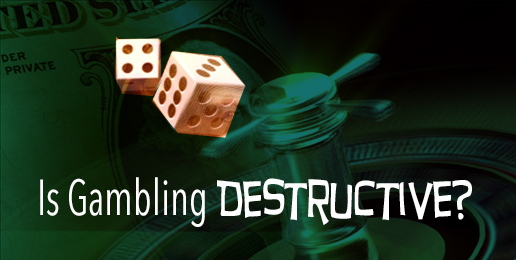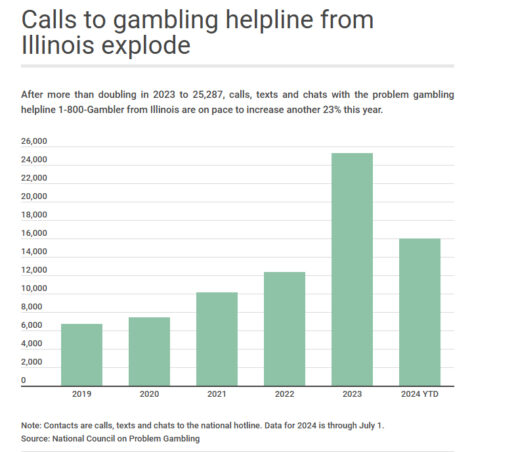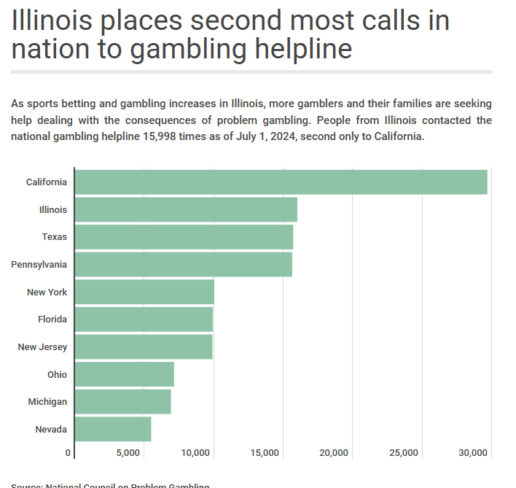
Legislation to legalize highly addictive online gambling, also known as iGaming, remains a possibility during the final days of the regular session, State Representative Bob Rita (D-Blue Island) recently told The Center Square.
Meanwhile, several entities have expressed concerns about market saturation in Illinois’ gambling industry. John Kindt, a gambling policy critic and professor emeritus of legal policy and business at the University of Illinois at Urbana-Champaign, has criticized the state for market saturation, describing the situation as a “lose-lose-lose downward spiral for the state.”
(Click HERE to see a timeline of gambling expansion in Illinois.)
In their search for new revenue, some Illinois lawmakers see online gambling as the solution. Legalizing internet betting would effectively turn smartphones into “pocket casinos,” dramatically expanding the reach of Big Gambling by adding blackjack, poker, and slot machines to an already growing menu that includes sports betting and the Illinois Lottery.
State Representative Edgar Gonzalez (R-Chicago) and I discussed the pros and cons of such legislation recently with Paris Schutz on his program, Paris on Politics:

As you heard from Representative Gonzalez, proponents of gambling believe that legalizing online gambling could be “a huge financial boon” for Illinois. But we have heard that before. Back in 1974, the Illinois Lottery was established with the specific aim of funding K-12 public education. Despite this, the state continues to grapple with education funding shortfalls.
Illinois faces a formidable financial landscape, burdened by an estimated $143.7 billion in unfunded pension liabilities. This immense obligation is compounded by over $40.4 billion in outstanding bonded debt, which includes both general and special obligation bonds. While still substantial, the projected $1.7 billion budget deficit for fiscal year 2026 pales in comparison to the significant long-term financial challenges we face.
In one year in Illinois, from March 2024 to March 2025, the state share of gambling revenue was just shy of $1 billion – $977.997.784.80 to be exact – from video gaming alone. That doesn’t include sports betting, horse racing, and casinos. Now we have new casinos in Chicago, Homewood, Danville, Rockford, Carterville, and Waukegan. These money pits join established casinos in Alton (1991), East Peoria (1993), Rock Island (1992), Aurora (1993), Elgin (1994), and two in Joliet (1992 & 1993).
If gambling expansion were a magical solution, the explosion of gambling in Illinois should have solved most of our state’s financial troubles by now. Instead, what we’ll end up with are more addicts, broken families, and bankruptcy.
Take ACTION: Click HERE to send your state lawmakers an email or a fax to tell them “NO MORE GAMBLING — PERIOD.” Don’t delay in speaking out. With only two weeks left before state lawmakers adjourn for the summer, this gambling bill may move fast.
Is Gambling Destructive?
The answer is simple. Yes.
There is a reason it used to be illegal. Gambling used to be considered a vice. It was often seen as promoting greed, laziness, and moral decay, since it involves winning money without productive labor. Social science reports warn of how gambling contributes to poverty, broken families, and addictions.
Illegal gambling operations have been linked to organized crime, corruption, and underground economies. Thomas Hampson points out that the mob is still involved, saying
[The mob] persists in illicit activities such as loan sharking, extortion, bribing officials to infiltrate legal gambling ops, rigged games, money laundering, unlicensed gambling activities (card games, unlicensed online casinos, unlicensed sports betting).
Not Family Friendly
Problem gambling is also linked to increased rates of both divorce and suicide. Consider:
- The National Gambling Impact Study Commission (NGISC) found that the lifetime divorce rate for problem gamblers was 39.5%, compared to 18.2% for the general population.
- The NGISC report acknowledged the association between problem gambling and suicidal ideation and attempts. It cited research indicating that pathological gamblers have a significantly higher risk of suicide compared to the general population and even those with other addictive disorders.
Additionally, research consistently demonstrates a significant link between problem gambling and serious financial challenges, including higher rates of both bankruptcies and foreclosures.
- Problem gambling often leads to substantial financial losses and the accumulation of significant debt through various means, like credit cards, loans, and borrowing from family and friends.
- Studies have shown a strong correlation between gambling and debt. Banking data analysis has indicated a connection between increased gambling consumption and a higher likelihood of foreclosure.
Gambling Addictions
An August 13, 2024 Rockford Register Star article asked and answered the headline: Could Problem Gambling Be a Growing Problem in Illinois? Calls to Helpline Skyrocket.
Illinois Council on Problem Gambling Executive Director David Wohl said it makes sense that we are seeing an uptick in problem gambling as the sports betting industry explodes, slot machines have become ubiquitous across the state and new casinos open.
“The more people are exposed to it, then you could draw the conclusion that more people may start to develop gambling problems,” Wohl said. “Gambling is everyplace.
“I remember watching a football game and they would never talk about betting. Now, the announcers are talking about the line on the game as they’re announcing the game. That just blows my mind.”
The chart, included in the article, only shows half of 2024 with 15,998 calls made to the hotline – on pace to be 23% higher than in 2023.

Nationally, calls from Illinois to the national gambling helpline were second only to California, which has more than 3 times the population.

Illinois lawmakers legalized sports betting in 2019 and online sports betting in 2020, adding to the problem. This style of gambling is popular among young adults and college students, and it likely accounts for some of the increased hotline calls.
The Illinois Department of Human Services claims that 383,000 Illinoisans have a gambling problem, and an additional 761,000 are at risk for developing a gambling problem. One of their strategies is to include consistent funding toward gambling problem prevention and services, increase awareness about problem gambling, and improve holistic treatment for problem gambling.
So, to the habitual chronic gamblers out there, the more you spend, the more dollars are available to help you overcome your gambling problem.
Bottom Line
If this bill passes, the recent rise in calls to the Gambling Help Hotline strongly suggests we will see an inevitable increase in individuals struggling with addiction, more families facing devastation, and a greater number of bankruptcies. This surge in help-seeking behavior paints a stark picture of the existing harm caused by gambling, implying that expanded access will only amplify these negative consequences.
If Illinois lawmakers were truly serious about addressing the state’s fiscal challenges, they would focus on cutting wasteful spending and reducing government bloat. Instead, expanding predatory gambling shifts the burden onto residents, relying on an unstable and unfair source of revenue while ignoring the serious social costs that come with promoting a harmful vice.






















